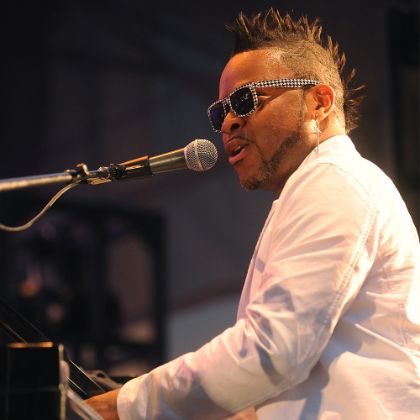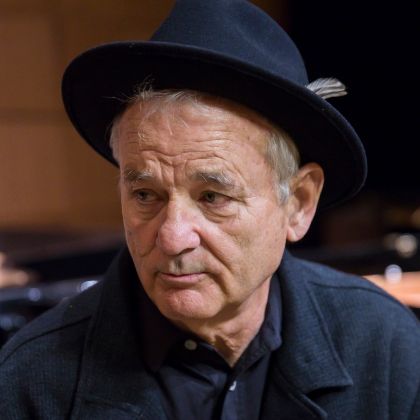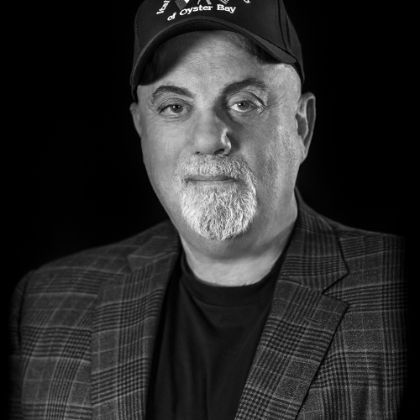Photo: Mathias Bothor
Listen Magazine Feature
Illuminating The Masters
Maurizio Pollini Reveals His Pathways In To Bach, Beethoven and Chopin, as Well As To More Modern Composers.
By Ben Finane
MAURIZIO POLLINI WON the International Frédéric Chopin Competition at the age of eighteen and went on to become one of the great pianists of his generation. Known for his technique and transparency at the keyboard, he champions a broad range of repertoire and, as I learned in conversation, a scholarly approach to each composer within it.
I spoke to Pollini in the afternoon before one of his three Chopin programs at Carnegie Hall. We discussed classical music over the blare of smooth jazz in a hotel café on Manhattan’s Upper East Side. After my first question, the Italian hesitated and asked if we might wait until his espresso arrived. When it did, he downed it in a sip, reflected for a moment, and said, “Okay. Let’s begin.”
This is a Chopin year. I imagine that relationships with composers change over time, and I wonder how your relationship with Chopin has changed since your competition year?
My competition year in Warsaw was many years ago, in ’60. This was the most important moment in the beginning of my relationship with Chopin. It was also the beginning of my relationship with Arthur Rubinstein, who was on the jury of the competition and was very kind to me. And I was able to hear him play — he did some marvelous concerts there. From this began a friendship that continued for many years. I saw him rather frequently in Paris and when he went to Italy to give concerts . . . but you are asking about my relationship to Chopin.
The contract with this extraordinary composer for the piano has been there for all my life; I have never stopped playing Chopin. He is a unique composer, you see. He is somebody who wrote for the piano perhaps better than anyone else, who invented a marvelous sonority for the instrument, who has a style of playing which has little relation to the style of other musicians. The way you play Chopin is much different from Liszt, for instance. Chopin has a particularly personal style, and what is more important is the magical effect of his sonorities, the depth of his music. . . . His late work shows such density, a master of composition. My relationship with Chopin has become, if possible, closer and closer to his music as time passes — I have become more and more enthusiastic. He’s a miracle.
Also during this centenary it would be a very good thing to remember Robert Schumann, who is a composer of about the same level of Chopin and with so many works that are not often played. This could be the right moment to make them better known to listeners. With Chopin, there is less to do on this front because he practically wrote only masterpieces, in a sense. Those works with an opus number — he accepted these — are all masterpieces. But there are masterpieces among the works Chopin neglected because he was extremely severe, so strict with himself.
What is special for you about Schumann?
Undoubtedly another miracle, Schumann. It is surprising that some of the greatest interpreters of Chopin . . . [Pianist–conductor Alfred] Cortot has said that he appreciated the music of Schumann more than that of Chopin. Arthur Rubinstein has said that Schumann might have been even greater than Chopin. I don’t agree [chuckles], we should be clear. But I think that Schumann undoubtedly remains a miracle of the nineteenth century and it is important to explore his production and his seldom-played works.
You have mentioned Rubinstein twice now already. What did you learn from him? Was he a mentor for you?
[Smiles.] I learned from him because he was an example of how Chopin should be played. I always referred to Rubinstein as an ideal, together with Cortot — completely different from Rubinstein, but also extremely convincing and great. I learned from Rubinstein by listening to him, not through conversation. I remember only — if there was a lesson he was meant to give me in one minute — him putting his finger on my shoulder during the competition as I played, saying, ‘I play only with the weight of the arm, yet I am never tired.’ The finger was so heavy! It was a very short lesson about how to play the piano.
He showed you where your power should come from?
From your whole body, in effect. Obviously, the shoulder shouldn’t stay up.
During your respite from performance following the Chopin Competition, when you focused on expanding your repertoire, it has been said that you struggled with perfectionism. Is that true?
No [scoffs]. I never gave any importance to — in fact, I saw and see very well the limited aspect of — a performance devoid of errors. This means absolutely nothing. I have struggled all my life for another thing: expressing the character of the composer, the character of the music. This has always been a more important goal — from then to now this has been a constant: To try to understand and convey the composer’s intention.
This period of repertory expansion wasn’t limited to Beethoven and Schumann but also included Berio and Boulez, Nono and Stockhausen.
These came gradually.
“I think it’s a priority of music today to enlarge the repertoire of everyday: to make the music written today accessible and known by a larger audience.”
What drew you to these more modern voices?
I had already heard a performance of composers of the Second Viennese School. I had a recording of [Dimitri] Mitropoulos’ Wozzeck and had heard many performers doing this music. So, gradually, I started to add some of these pieces to my repertory: Schoenberg first, then Boulez’s Second Sonata, and later, in the seventies, Stockhausen, Manzoni. I liked Berio but didn’t play him. Nono, with whom I had an important friendship, has composed two pieces for me. Ultimately, it is clear that my modern or contemporary recordings are not many, but I want to point out that this relationship with modernity has been very important for me.
How so?
It contributed to the development of my reality among musicians.
As a champion of modern and contemporary music, do you feel there are steps that must be taken to encourage performance of these works?
I think it’s a priority of music today to enlarge the repertoire of everyday: to make the music written today accessible and known by a larger audience. It’s really a peculiar situation. Two hundred years ago, almost only works of the moment were performed. Today, paradoxically, almost ninety-five percent of music performed every day is great works from one or two centuries ago, and there is very little place for compositions of today. It’s obvious that the geniuses of the past are popular and appreciated [laughs], and I would be the last person to complain about it, but I think there should be appraisals of the music of today. It is fantastic that so many composers worldwide write with avant-garde tendencies, yet with so few chances of performance or success. The existence of these composers shows that there is a necessity of musical language development and the invention of something new.
You said once that you can only talk of the difficulties of a specific composer, that each composer poses entirely different problems.
Si si, it seems to me obvious. [Laughs.]
It seems obvious — okay. So are the priorities for a work the same, or do the priorities, too, have to change? You said the top priority is to transmit the word of that composer. So let’s take, say, a Bach Partita and a Beethoven Sonata. Are there different priorities for approaching these two works?
You probably start with a knowledge of the word of the composer that you know from your own performances of his work, and with a knowledge of his music — not for piano. For instance, I have learned very much about the word of Bach through the analysis of his cantatas. From my studies it was clear that a very important priority for Bach was to express the meaning of the text on which he was working. Even if the text was not so literary, he wanted absolutely to be near the word and to express this word in music. Therefore, I think there is an important truth in the Albert Schweitzer book on Bach [J.S. Bach]. He points out this aspect in Bach to the extreme, perhaps too much. But he extends this concept thoroughly and accessibly. I find that each cantata tries to express what is in the text and is different from the others. So there is an extraordinary variety of character in the music of Bach — absolutely fascinating and marvelous. Obviously, when playing a work like The Well-Tempered Clavier, every prelude and fugue is a different world, in a way.
I can tell you something about Beethoven. You know there are [musical] sketches by Beethoven. There is a book of these sketches; I have one in my house. Beethoven put down all the musical ideas that came into his head. There are probably thousands of themes, very difficult to read, but found on these pages nevertheless, spanning a couple of years. You can find some of the themes of the works composed in that period inscribed here. Clearly, for each of his works, Beethoven made a choice among the thousands of ideas that came to his mind. The choice was made, in my opinion, to use only the most extraordinary of themes; there was such a strict selection. Beethoven said, apparently, that when the ideas are good, the elaboration is not of such great importance, which is a paradoxical statement.
Of course, because he’s so obsessed with development.
[Laughs.] Being Beethoven, he knew how to develop ideas, clearly. But I learned from this that every theme by Beethoven has to convey something absolutely extraordinary. Otherwise, you wouldn’t understand it. In his last composition, he perhaps worked it in a slightly different way, because I saw the manuscript for the Ninth Symphony, and it is written out three or four times. So even the elaboration [development] was done many times. We can imagine that perhaps that was a different way of composing, peut-être.
“We pianists have the privilege of having an enormous repertoire, much more than any person can do in his life.”
Let’s do another one. How about Chopin?
Chopin was an extremely different composer from Beethoven. It’s hard to say, for him, what was the process of inspiration because he is extremely mysterious. What is certain is that the elaboration of this material was a painful process in which, as Georges Sand said, the composer was struggling with his music and was never satisfied. He tried different ways of writing the same chord repositioned on the keyboard. For instance, at the end of the Second Ballade we have, with the same harmony, four different iterations on the piano: two alternatives in the manuscript, one alternative in the German edition and a fourth alternative in the French edition. So yes, Chopin struggled to obtain perfection. The result undoubtedly can be seen. These masterpieces of Chopin were given to us in a state of absolute perfection, not one note too much, not one note too little. Every bar is written in the most refined and marvelous way. So Chopin is one of the most difficult composers because you have to combine a Romantic temperament and character with a perfectionist realization of every detail. The two things together are difficult.
Does that speak to your approach at the piano? Romantic temperament with a perfectionist realization of detail?
[Laughs.] As I told you, I try to do as well as I can the music of each composer. Undoubtedly in Chopin you have to do this. He hated vulgarity. Liszt said in his book on Chopin [Life of Chopin] that Chopin liked Bach and Mozart and did not have much enthusiasm for his contemporaries, including Beethoven. But Liszt says that Chopin had something to say about certain pages of Don Giovanni that he thought were vulgar. [Laughs.] So this is to help you understand what a difficult man Chopin is.
Is there music for solo piano that you most enjoy?
We pianists have the privilege of having an enormous repertoire, much more than any person can do in his life. Pianists are extremely lucky. There is much music I like that I didn’t play. Ravel, for instance, I played very little. Mirroirs I have played a few times in concert — also here in New York, Gaspard de la nuit. . . . I played very little Scarlatti — a phenomenal composer with inexhaustible fantasy. I like how Horowitz plays Scarlatti — extraordinary.
Is Ravel’s music special for the way it weds Classical and Romantic elements?
I would like to address this contraposition. Every great composer is at the same time Classical and Romantic. For instance, Chopin is doubtless a Romantic composer, but Rubinstein said, perhaps paradoxically, that Chopin was a Classical composer and Beethoven was a Romantic composer. And there is some truth in this statement. But these, if you will, opposites, in any great work, in any great composer, have to combine. Romanticism and Classicism, while historical periods, don’t give the key to the character of the composition. I can say that Mozart is a similarly Romantic composer. We have good reason to say this. We have good reason to say Bach is a Romantic composer. He is able to convey such tremendous emotion and passion in his cantatas. On the contrary, Schumann, who is by all means a prototype of Romanticism, was able to compose with such mastery from minimal, how you say, short —
Motives?
— motives, short elements, fragments of notes, etcetera — he was able with a great art of variation to do marvelously with these minimal elements, with the greatest mastery of composition. So you see this contrast. I say this to animate a little bit our vision of the terms. And there is also great emotivity in today’s composers. In Schoenberg, it is enormous. How a composer who was incredibly expressive in his tonal compositions — Verklärte Nacht, Pelleas und Melisande, Gurrelieder — how is it possible he lost it going on with atonality? He was absolutely the same. We have to understand the new world he invented.
Just because his language shifted . . .
Exactly. And this is also a priority for Boulez, for instance. In his Second Sonata, which I recently played, there is very strong emotion — not quite declared, but very strong. And there is a world of fantasy in early Stockhausen. [Pauses.] So we have to go on.
This article originally appeared in Listen: Life with Music & Culture, Steinway’s award-winning magazine.
related...
-

Soundboard — Davell Crawford
Davell Crawford discusses the rich jazz tradition of New Orleans, the fall of New York, moving forward, and employing the multiple personalities that live within you.
Read More -

Soundboard — Bill Murray
Bill Murray discusses American Letters, Mark Twain, James Thurber, absurdity vs. ridiculousness, failure, getting to work, writing vs. acting, rhythm and flow, and improvisation.
Read More
-

Same Hits, Different Day
Living legend Billy Joel talks about the staying power of his music, the alchemy and process of songwriting, the origins of his aesthetic, Beethoven and the Beatles, and what he’s trying to learn now.
By Ben Finane
Read More